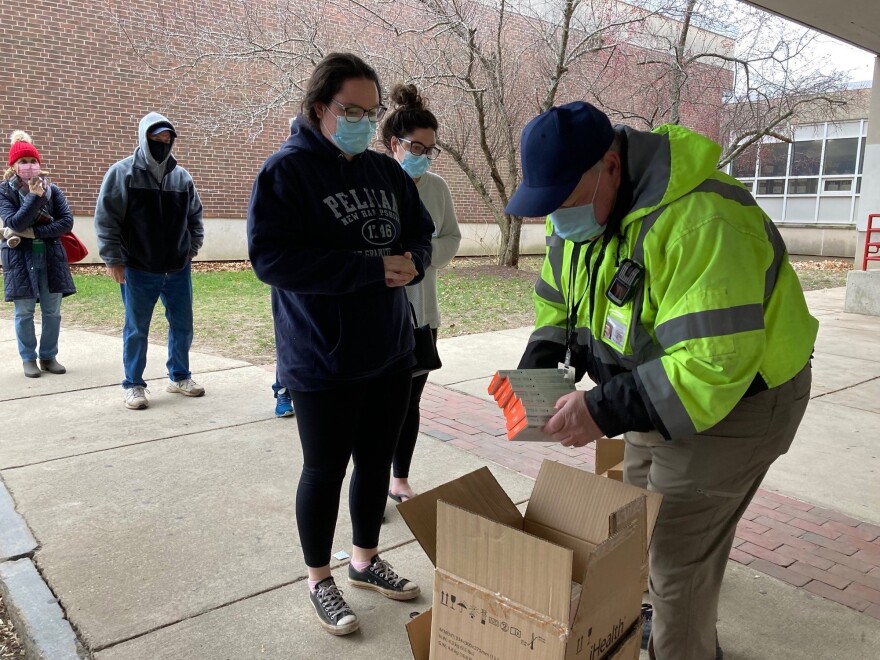In Lowell, Massachusetts, a long line of cars snakes around the local middle school. The reward at the front of the line: free rapid tests. Carol Mehigan and her niece, Chantelle, skipped the line and showed up on foot. Mehigan was beaming.
"Oh my god, this is fantastic," she said to the volunteer who handed her the tests.
Lowell is a virus hotspot in a state that has spiking COVID numbers. Mehigan and her extended family have been playing it safe. Despite having four families under one roof, they rarely visit one another's apartments. Nobody wants to risk giving COVID-19 to Chantelle's newborn or Mehigan's elderly mother.
But for Christmas they're getting together. They've decided on a scaled-back gathering of 15 people. And Mehigan has a plan for exactly when she'll be using her free rapid test.
"I'm using it by the end of the week – before Christmas day," she said.
With the holidays approaching and the omicron variant spreading quickly, there is growing demand for rapid tests and supply has not kept pace. On Tuesday, President Biden announced that the federal government will help, giving out a half-billion free rapid coronavirus tests starting in January. Several cities and states are already offering COVID tests free to their residents, handing them out at libraries and mailing them to people's houses. But, experts say, more is needed.
Mehigan's rapid test is one of 2 million free test kits being distributed in Massachusetts to the 102 cities and towns with the highest percentage of families below the poverty line.
"The goal here is to help those families who face the greatest financial hardship and might have difficulty attaining rapid tests at a pharmacy," said Governor Charlie Baker at a press conference on Dec. 13 announcing the program.
Massachusetts is joining a growing number of other states – including New Hampshire, New Jersey, Washington, Iowa, Maryland, Ohio and Colorado – with programs that offer free COVID testing to some or all of their residents. Several cities – including Boston, Philadelphia and New York – are joining in too.
Some states, such as Colorado, have been distributing free rapid tests for months. And these programs have been popular. In New Hampshire, their supply of 800,000 test kits were snapped up in a day.
States are stepping up to fill a gap left by the federal government, said Lindsey Dawson, an associate director at the Kaiser Family Foundation who tracks COVID testing availability.
"The federal government has really invested in vaccines and making vaccines freely and widely available for people and [it] hasn't really done that with tests," Dawson said. "We are starting to see some movement now with the new announcement [from the White House of 500 million free rapid tests], so it will be important to watch to see if that momentum continues."
Dawson said a pair of rapid tests costs anywhere from $14 to $30 and that access to them – even for those able to pay – has been inconsistent. Just a few weeks ago things looked good, but "the supply has really dwindled even today compared to what I saw yesterday."
White House chief medical advisor, Anthony Fauci, said there's "extraordinary demand" for testing. He said that's a good thing and that the administration is working to improve access.
One reason supply isn't keeping up with demand is test manufacturers are being cautious, said Atul Grover, executive director of the Association of American Medical Colleges' Research and Action Institute.
"If you go back to H1N1 [flu in 2009], these companies did produce the test. The challenge was they didn't get sold. And so I think companies are very reluctant to go ahead and scale up production," Grover said. "Unless they have a guarantee that someone's going to buy them."
Grover called Biden's announcement of 500 million rapid tests "a step in the right direction." But, he said, more details are needed and more tests are needed, pointing out that 500 million tests translates into less than two tests for every American.
"Five hundred million would be enough if we were talking about a supply for a week. And [if] we were told, 'The next 500 million are going to come every week starting in February.' Great, I'd be less worried," said Grover.
Boosting the supply of rapid tests isn't just about preventing the virus's spread. It is also necessary for treatment, Grover said. New oral COVID medications need to be taken within a few days of symptoms starting – and that requires being able to find a COVID test.
Copyright 2021 WBUR



